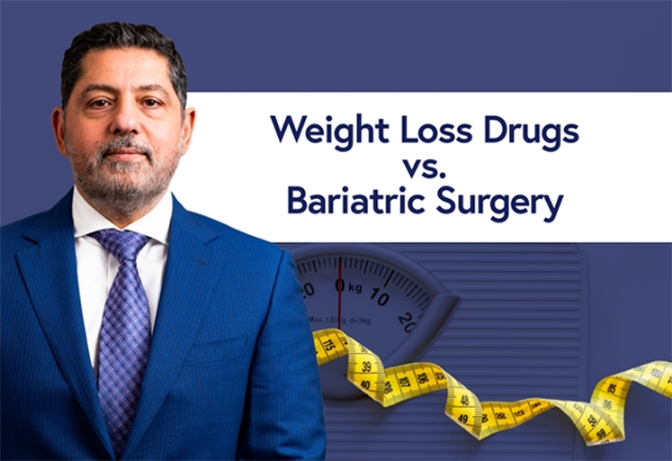Weight Loss Drugs vs. Bariatric Surgery – Which is Right For You?
If you’re trying to lose weight and finding it difficult, you may have considered taking medications or undergoing bariatric surgery. Both of these... read more
Call Us Today (732) 640-5316
E-Waiting RoomDiaphragm hernias are opening(s) that can occur in the diaphragm muscle, and generally occur at a natural opening, such as the hiatus where the esophagus travels through into the abdominal cavity. These are known as hiatal hernias. Diaphragm hernias can also form in other areas of the muscle such as what occurs with a Morgagni Hernia, Bochdalek Hernia, or Traumatic hernia (rupture from blunt force). The most common type of diaphragm hernia is the Hiatal Hernia.
The diaphragm is a sheet of muscle that separates the abdomen from the chest cavity. It has an opening in the middle called the hiatus. The food pipe, or esophagus, runs through the hiatus in order for it to enter into the stomach. When the hiatus is enlarged, the stomach can bulge up into the chest causing symptoms such as heartburn, regurgitation, reflux, chest pain, and trouble swallowing.
There are several types of hiatal hernias (aka paraesophageal hernias):
The first type of hiatal hernia is called a sliding hiatal hernia. This is the most common type of hiatal hernia and is a result of the lower esophagus and top of the stomach sliding up together into the chest through the hiatus.
Other, less common types of hiatal hernias are called paraesophageal hernias. These occur when a section of the stomach goes up into the chest next to the esophagus, or when other organs such as colon, intestine, or spleen go up through the hernia defect into the chest. These types of hernia can be more dangerous because they are not always associated with symptoms and can result in the stomach tissue becoming twisted off from its blood supply resulting in “strangulation” of the stomach. In most cases, however, people have mild symptoms such as heartburn or gastroesophageal reflux disease (GERD) due to the structural changes associated with the hiatal or paraesophageal hernia.
There are many factors that can result in a hiatal hernia, but for most patients, the cause is unknown. It is possible that some people are simply born with a short esophagus or a large hiatus, or develop these conditions over time due to weakened tissue, or chronic scarring of the lining of the lower esophagus from acid reflux resulting in contraction or shortening of the overall esophageal length. Other causes include increased intra-abdominal pressure in the abdomen due to conditions such as obesity, pregnancy, chronic cough or straining during bowel movements. Experts also predict that patients who have gained a considerable amount of weight are at risk for hiatal hernia development, along with people over the age of 50 and people that are smokers.
Hiatal hernias occur more often in women, people who are overweight, and people older than 50.
It is not uncommon for people to have no symptoms associated with their hiatal hernia. When symptoms do occur, they normally consist of heartburn and gastroesophageal reflux. Other symptoms may include pain or discomfort in the stomach or upper abdomen, chest pain, a harsh or sour taste in the back of the throat, as well as bloating and even excessive belching.
Chest pain due to a hiatal hernia feels very similar to that experienced during a heart attack. It is crucial to seek evaluation and treatment immediately so that you can be correctly diagnosed and treated.
Symptoms of a strangulated hiatal hernia or associated obstruction include: abdominal pain, the inability to have a bowel movement (constipation), the inability to pass gas, or development of persistent nausea and vomiting.
A barium swallow study, which is a specific X-ray procedure, can enable the proper evaluation of the esophagus to correctly diagnose a hiatal hernia. Other ways to diagnose a hiatal hernia are by CT scan or esophagoscopy (EGD). The esophagoscopy is a procedure where an endoscope, a long-thin flexible medical video camera, is inserted through the mouth into the esophagus and stomach and allows the examination of the upper digestive system.
Hernia surgery is not necessary when patients do not have any associated symptoms. For mild symptoms such as bloating or heartburn there are often ways a hiatal hernia can be treated through healthy lifestyle changes. These changes include maintaining a healthy weight, limiting fatty, acidic, and caffeinated foods, along with avoiding alcoholic beverages and quitting smoking. It is also recommended that the person avoid eating at least 2-3 hours before going to bed and elevating their head while sleeping to reduce the amount of acid exposure into the lower esophagus. Other treatments include taking antacids to chemically neutralize stomach acid, thereby reducing heartburn symptoms. For patients with persistent heartburn symptoms that are not well-controlled with lifestyle changes, or for patients whom antacids no longer work well, surgical evaluation is warranted.
Courteous, professional front desk staff. My questions have been answered with accuracy and swiftness. The medical team are great. All of the doctors I’ve encountered have been honest and friendly. I am pleased with the care I’ve received and would recommend Advanced Bariatrics to a friend who was invested in the services provided here.
Joan C.Patients who suffer the following conditions along with a hiatal hernia may be required to undergo surgical repair:
There is no guarantee that a hernia will not return after surgery. The best way to reduce your chances of recurrence are to avoid smoking, maintain a normal weight, and avoid any abdominal stressors such as straining, heavy lifting, and chronic cough. Repairing recurrent hernias (those that have occurred after previous repair) are exceedingly complex difficult cases, and the chance for definitive (lasting repair) goes down with each subsequent repair. Your first chance at repair is therefore the best one, so it is in your best interest to reduce as many personal risk factors for recurrence as much as possible before the first operation, and maintain a healthy lifestyle afterwards.

Dr. Ragui Sadek is a premier surgeon who established a state-of-the-art and one of the safest bariatric surgery programs in the state. Dr. Sadek has fellowship training in both laparoscopic/bariatric surgery and surgical trauma/critical care, allowing him to safely perform complex surgeries on patients who have been turned down by other practices. As a Clinical Assistant Professor of surgery at RWJ Medical School & the Director of bariatric surgery program at RWJ University Hospital, Dr. Sadek offers a cutting-edge range of laparoscopic, robotic, & bariatric surgical procedures with a complication rate substantially below the national average.
Dr. Sadek is a Clinical Assistant Professor of Surgery at Rutgers-Robert Wood Johnson Medical School and a Fellow of the American College of Surgeons. Having performed more than three thousand advanced surgical procedures, Dr. Sadek has established a strong patient satisfaction rate and a solid reputation among the surgical community and is renowned as a top physician in his field by International Association of Healthcare Professionals. As a board-certified surgeon, he holds affiliations with the American Society of Metabolic and Bariatric Surgery and the Society of American Gastro Endoscopic Surgeons. More about Dr. Sadek
Stay current with Advanced Surgical & Bariatrics of New Jersey

If you’re trying to lose weight and finding it difficult, you may have considered taking medications or undergoing bariatric surgery. Both of these... read more

Are you frustrated with your inability to lose weight? Tired of being trapped in an endless cycle of yo-yo dieting, over-exercising, cleanses, and... read more